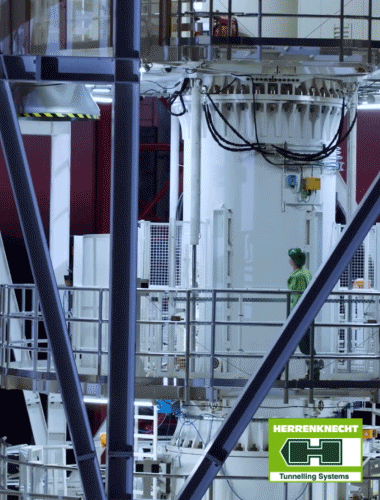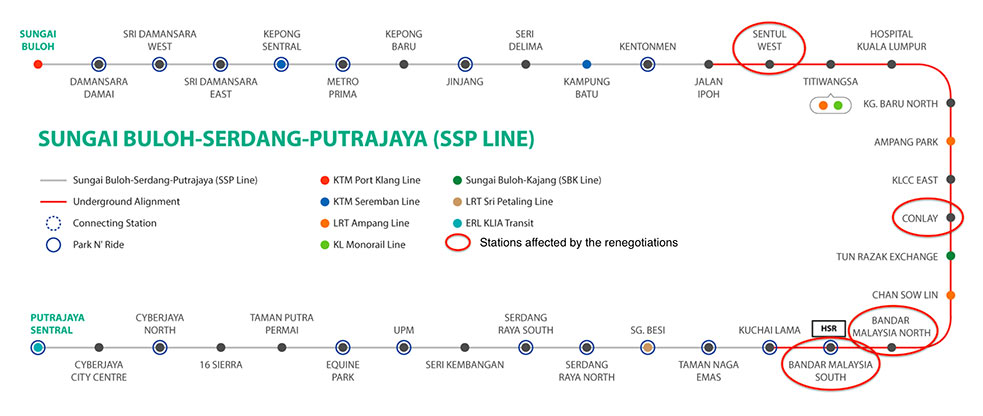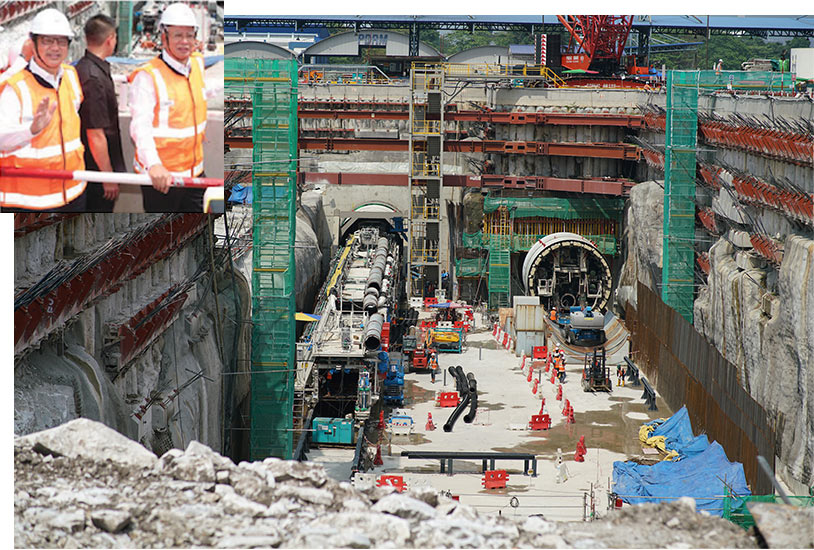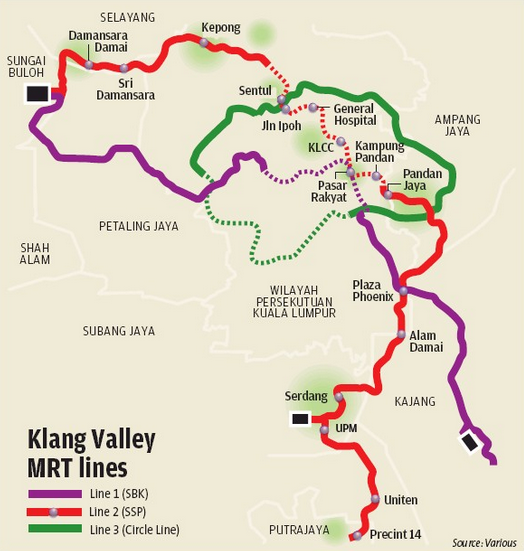Back from brink for KVMRT underground works 01 Nov 2018
Threatened termination of the underground works contract for the Klang Valley MRT Line 2 in Kuala Lumpur has been averted. After direct intervention by Malaysian Prime Minister Tun Dr Mahathir Mohamad, the Government and contractor MMC-Gamuda have secured additional cost reductions and MMC-Gamuda continues as contractor for the underground works.
Renegotiations conducted by Minister of Finance Lim Guan personally resulted in agreement with MMC-Gamuda to reduce the original 16.71 billion Ringgit (MR) underground contract by a total of MR 3.6 billion, or 21.5%, to MR13.11 billion or from US$3.99 billion by $860,000 to $3.1 billion.
In earlier negotiations MMC-Gamuda had offered a reduction of RM2.13 billion ($509,000) for the underground works, which was rejected by the Ministry of Finance. This was followed by the announcement to terminate the contract in anticipation of a lower retendered bid.
While restoring MMC-Gamuda as the contractor and delivery partner of the underground works, the renegotiation comes at different cost implications.
In the first round of cost cutting negotiations, MMC-Gamuda proposed completing four underground stations structurally, including installation of their ventilation and train operating systems, but leaving their cladding and finishing works to sometime in the future and after their public opening. These four stations are Bandar Malaysia North and South, Conley and Sentul West (Figs 1 and 2). Under the new negotiations, the Government insisted that Conley and Sentul West Stations be finished completely and postponing the finishing works of the Bandar Malaysia North and South Stations to a future date under a different contract.
Other proposed cost savings offered by MMC-Gamuda and accepted by the Government in the initial negotiations include lowering the specifications for mechanical, electrical and architectural finishes of the stations and reducing the number of exit and entrances to underground stations.
Work on all four stations has started with diaphragm walls, or secant piles for stations in karstic limestone, completed and and excavation started at Sentul West Station. Excavation of Bandar Malaysia North Station is also completed and the station is being used as the working access for the first two TBMs lunched on project. Excavation of Bandar Malaysia South Stations and its adjoining open-cut crossover will also have to be excavated and the TBMs pulled through to continue their drives. It will also be fitted with ventilation, emergency escape facilities and train control and signalling to allow metro trains to run through them when the Line opens for service but their international station structures, floors, cladding, ceilings and station operating fixtures, are removed from the MMC-Gamuda contract for completion at a later date. This renegotiated scope of work provides a larger cost savings overall compared with the original MMC-Gamuda proposal but when and how Bandar Malaysia North and South Stations will be completed to operating stations - and at what increased cost - is an issue to be managed by a future procurement process.
Under earlier negotiations, MMC-Gamuda, as delivery partner of the above ground sections of the 52.2km long Line 2, either side of the central 13.5km underground section, offered to reduce the cost of those above ground works by converting the procurement to a turnkey contract, thereby saving a RM5.22 billion 23% ($1.25 billion) on the original RM22.64 billion to RM17.42 billion ($5.41 billion to $4.1 billion).
With these combined agreements, the total cost of the MRT Line 2 construction with MMC-Gamuda is reduced by RM8.82 billion, or 22.4%, from RM39.35 billion to RM30.53 billion (a 22.4% $2.1 billion saving from US$9.4 billion to US$ 7.3 billion). This excludes interest costs during construction, land acquisition costs and other project management costs. It is unknown if any cost savings have been accrued by reducing the supervisory staff of the MRT organisation as the Government's client for the project. Current levels of MRT staffing for construction of Line 2 is reported to be greater than 600.
References
- Termination of KVMRT Line 2 underground works – TunnelTalk, October 2018
- TBM excavation begins for Kuala Lumpur Line 2 – TunnelTalk, March 2018
- KVMRT to repeat Line 1 success for Line 2 – TunnelTalk, April 2016
Termination of KVMRT Line 2 underground works 11 Oct 2018
As part of a political stand-off, the Malaysian Government is drawing back from its announcement earlier this week to terminate the underground works contract of the new metro Line 2 project currently under construction by the MMC-Gamuda JV. The impasse arises following alleged failure to reach cost savings in the RM15.47 billion Ringgit (about US$4 billion) construction contract for the central 10 stations and 13.5km long underground alignment. Government Finance Minister Lim Guan Eng said in a statement that the unfinished underground work would be retendered through an international open tender process. “This decision was made after considering that the Federal Government can achieve further significant savings by retendering the underground work package compared with the offer made by the existing contractor," said Lim.
Lim is Finance Minister of the new Government of Malaysia elected in a surprise result in May this year (2018). In defeating the incumbent ruling coalition, the new coalition ran on a ticket of tighter fiscal control and reduction of national debt. As one of the largest public infrastructure projects in the country, the new government targeted the 52km long Klang Valley Mass Rapid Transit Line 2 project for potential cost savings. In negotiations that started two months ago, MMC-Gamuda, as Delivery Partner of the Line, did agree a RM5.22 billion 23% saving on the original cost for the above ground portion of the Line by converting the project delivery partner model for the works to a single turnkey contract. It had offered also a 24% reduction for the balance of the underground works. MMC-Gamuda was successful Delivery Partner and construction contractor of the underground section of Line 1 of the KVMRT between 2012 to 2017.
In its response, MMC Gamuda said that it had not received any official confirmation from MRT Corp, the counter party to the award of the Line 2 project, that MMC Gamuda had been terminated as underground contractor, adding that through its statement, the Ministry of Finance informs that it accepts only the offer in respect of the elevated works.
Work on the underground section of the new line started in 2016 and the first two of 12 TBMs required for the 11km long running tunnels started in March this year (2018). To date, MMC- Gamuda state that the contract is now at 40% complete with work on all open-cut station boxes progressing and the first two of 12 running tunnel TBMs now about 1km each into their drives, another two are assembled and ready to start and the remaining eight are scheduled to start from next month onwards. The balance of underground works to be completed, it states, is valued at RM9.6 billion.
The RM2.3 billion or 24% reduction of the underground works contract offered by MMC-Gamuda is achieved through: lowering specifications for mechanical, electrical and architectural finishes of the stations; reducing the number of entrances to stations; and cancelling construction of four stations to provide six rather than 10 active underground stations.
MMC-Gamuda further states that two main factors have influenced the price of the Line 2 underground works. In comparison with Line 1, the employer’s requirements increased the scope of works significantly to include larger floor space in stations and a five-fold increase in the number of underground entrances and pedestrian walkways. In addition, the average depth of the diaphragm walls for stations for Line 2 is 51m, as compared with 39m for Line 1.
Construction is further challenged by the high risk of sinkhole incidents arising from tunnelling through the extreme karstic limestone beneath the city centre. To mitigate this risk the insurance industry introduced stringent risk management requirements on both MRT Lines 1 and 2 and MMC Gamuda developed the design of the variable density (VD) TBM with Herrenknecht to avoid the risk of sinkholes. The geological challenges presented by Line 2 require 12 TBMs of which 10 are VD TBMs which increases the need for pre-excavation grouting and ground improvement works prior to tunnelling.
In its statement MMC Gamuda said it was awarded the undergrounds works by MRT Corp in 2016 following an international competitive tender and that, due to the challenging ground conditions, that only five contractors had pre-qualified for the challenging works, of which MMC Gamuda was the only local contractor. In bids evaluation, MMC Gamuda scored the highest technical score and offered the lowest price, lower than the pre-tender design estimate.
MMC Gamuda warns that termination will result in immediate job losses to a work force of more than 20,000 personnel currently involved in the underground works supply chain, 3,000 employed directly by the MMC Gamuda JV; that termination would unjustifiably expose MMC Gamuda to a flood of lawsuits for compensation from terminated employees, sub-contractors, suppliers and manufacturers, whose contracts will be similarly terminated. According to the terms of the contract, in the unlikely event of termination, MRT Corp becomes the owner of all equipment, including all the TBMs, and all works completed to date.
The belief that more cost reductions for the underground works could be offered is based on a review by a local engineering consulting firm appointed by the Ministry of Finance. A significant part of the review findings were refuted by MMC Gamuda on technical grounds as being too simplistic and arising from a lack of relevant experience. MMC Gamuda has suggested the appointing of an international engineering consulting firm with the relevant experience to carry out an objective review looking into all reasonable engineering and technical possibilities. The JV also states that the Ministry of Finance has not established a target figure for costs savings that both parties could examine and negotiate with the assistance of an appointed international engineering consultancy.
For its part, MRT Corp, as the Government’s representative on the project, said the termination and re-tendering process would be “relatively complex”.

Then former Prime Minister Mahathir (bottom centre) opened the MMC-Gamuda Tunnelling Training Academy in 2011
In the days since the termination announcement on Sunday, 7 October, much has been written and reported about the situation, including an open letter from a young engineer working on the project to Prime Minister Tun Dr Mahathir to make his case for keeping the project and contract in place and progressing (see yellow editorial box). The plea to Tun Dr Mahathir is heart-felt and calls on the Prime Minister to remember when he guided Malaysia through its greatest period of growth during his 22-year term as Prime Minister of now the opposition party from 1981, championing major infrastructure projects including the iconic Twin Petronas Towers in Kuala Lumpur, the city's outstanding combined flood control and toll road SMART tunnel and the start of the heavy rail MRT system as part of his ambitions for Kuala Lumpur to be come one of the world’s leading international cities. In his retirement, Tun Mahathir officiated at the 2011 opening of the Tunnelling Academy established by MMC-Gamuda to train the workers needed specifically for underground construction.
Prime Minister Mahathir also has stepped in to review personally the cancellation of the Line 2 underground works contract. In a statement on 10 October, 2018, MMC Gamuda welcomed the move saying it remained committed to further discussion and cooperation with the Ministry of Finance in reaching an agreeable reduction of cost. It suggests an open book review of the cost savings objective with the appointment of an experienced international engineering consulting firm to manage proceedings and with a protection of its intellectual property rights and respect for commercially sensitive information. With that, MMC-Gamuda “therefore leaves the matter in the good hands of the Prime Minister, Tun Mahathir”.
Since it was inaugurated, and as part of its austerity programme, the new Governement has cancelled investment in the design and planning of the MRT Line 3 circle line (Fig 1) and put on hold progress towards construction of a long proposed and awaited high-speed railway line between Kuala Lumpur and Singapore. TunnelTalk will report progress on the Line 2 termination situation as it progresses.
References
- Kuala Lumpur Line 1 starts full operation – TunnelTalk, July 2017
- Final breakthrough ends KVMRT TBM tunnelling – TunnelTalk, April 2015
- KVMRT Line 2 releases tender documents – TunnelTalk, October 2015
- KVMRT to repeat Line 1 success for Line 2 – TunnelTalk, April 2016
- TBM excavation begins for Kuala Lumpur Line 2 – TunnelTalk, March 2018
- Kuala Lumpur opens tunnel Training Academy – TunnelTalk, December 2011
|
|
|
|
|
Add your comment
- Thank you for taking the time to share your thoughts and comments. You share in the wider tunnelling community, so please keep your comments smart and civil. Don't attack other readers personally, and keep your language professional.





